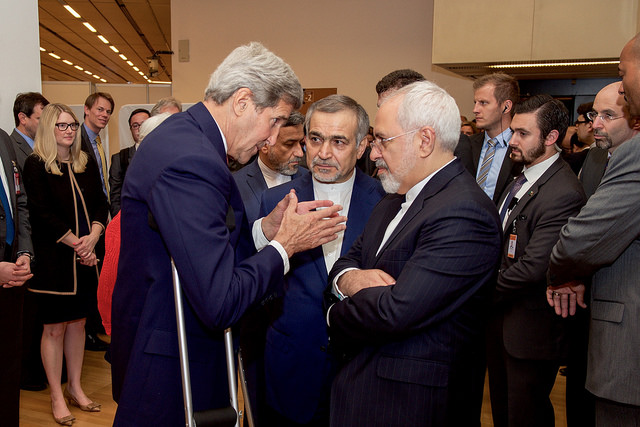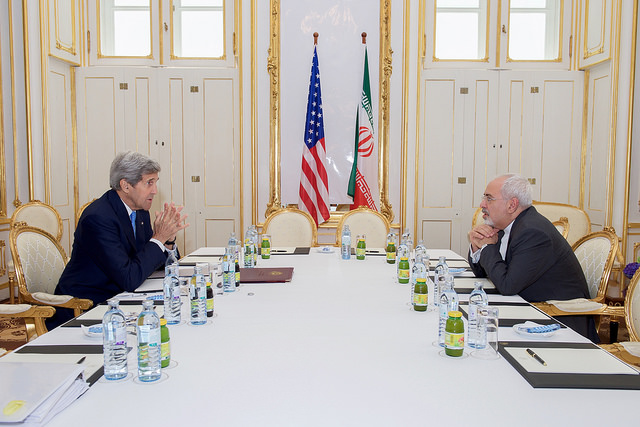Netanyahu’s mouthpiece largely parrots the prime minister’s warnings and fears; leading columnists in other newspapers label the deal a personal failure for Netanyahu, warn that the ground-breaking agreement actually puts a military option back on the table.
By Edo Konrad and Michael Schaeffer Omer-Man

Even before the historic nuclear agreement with Iran was announced Tuesday morning, Israel’s most widely read newspaper was parroting the prime minister’s condemnations of what he termed “a deal at any cost.” The front-page headline in Israel Hayom, which is regarded as a mouthpiece for Netanyahu, read: “A deal full of holes; concessions at any cost.”
Writing in Israel Hayom after the deal was signed a few hours after the newspaper went to print, former Israeli ambassador and Netanyahu ally Zalman Shoval wrote that the battlefield must now move to Congress, where Israel must convince the Americans not approve the agreement. Shoval goes on to warn that Israel’s considerations regarding its relationship with the U.S., “both in general and specifically when it comes to the Palestinian issue,” will change.
Writing in the Jerusalem Post-owned Maariv website, leading columnist Ben Caspit lamented what he described as Netanyahu’s personal failure. The only thing Netanyahu has been talking about, to anybody who will listen, at any opportunity, and for 20 years, Caspit wrote, is stopping Iran from obtaining a nuclear weapon.
Israel’s prime minister could have gotten a better deal, Caspit argued, if only he had played things smart — if he had been nicer to Obama, if he had appeased the administration and the world. “But Netanyahu preferred Sheldon [Adelson] and [Ron] Dermer and the radical settlers instead of the rational path.”
Also writing in Maariv, former Haaretz columnist and intelligence expert Yossi Melman argued that the deal is actually a success for Israel. For nearly a decade, decision-makers in Jerusalem knew they could only delay Iran’s nuclear ambitions. Through a combination of diplomacy, sanctions and covert assassinations and sabotage, and concluding with the deal signed in Vienna, Melman argues, Israel has accomplished just that.
“Even if the deal isn’t the best, the sky will not fall on Israel,” Melman writes. “[Israel will continue to be a strong regional power, with the best army, which has the most modern technology, and according to foreign publications, with a large arsenal of nuclear weapons.”
It’s bizarre to hear the Israeli government express deep fears and let loose worrisome cries about what might happen in 10 years when the Iran deal expires, Melman concludes. “This is the same government that has a hard time knowing what will happen in another month or two in Gaza, the Golan or in Lebanon, and which isn’t prepared to embark on even one long-term infrastructure project.”
Read: Deal will usher in an era of Iranian diplomatic engagement
In Yedioth Ahronoth, veteran Israeli journalist Ron Ben-Yishai writes that the deal has put “the military option back on the table.” According to Ben-Yishai, the Israeli government will be resigned to make a decision about whether to attack Iran “if and when the Ayatollahs decide to develop a bomb.” But apart from his free advice to the Israeli government, Ben-Yishai also has a few words to say about the Iranians themselves:
“We must remember that the Iranians are the world champions in fraud. Over the last 10 years they have gained experience that’s worth its weight in gold. Until the West understands what to do, the Ayatollahs will already have the knowledge and the modern, fast infrastructure to enrich uranium, and the ability to create a small warhead that can be launched using a missile. Under these circumstances, the ability to create a nuclear bomb is a matter of months.”

Writing in Haaretz, Middle Eastern affairs analyst Zvi Bar’el writes that the very fact that talks were held with Iranians has propelled the Islamic Republic into the position of regional superpower, which has “has achieved more than what its nuclear capabilities would have provided it.”
“Since the nuclear negotiations began almost two years ago,” Bar’el writes, “the Iranians have been shaking up traditional Arab alliances and have been drawing new lines of influence that are not limited to countries in turmoil such as Syria, Iraq and Yemen but go beyond them into the international arena.”
Moreover, Bar’el notes that Iran is now enjoying the fruits of the confrontation between Israel and the U.S. over the Iran nuclear issue, adding that the agreement has “enabled Iran to shake its image as an irrational country run by unenlightened scholars of Muslim religious law, because after all, there would be no reason to negotiate or sign a deal with such a country.”


